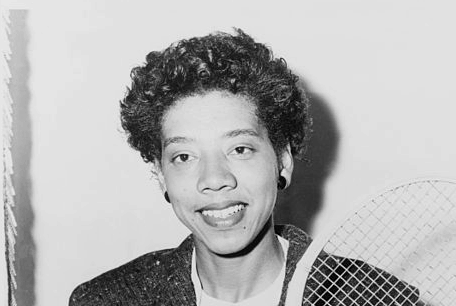Althea Gibson wasn’t fond of school and thought nothing of skipping classes; but she was dedicated to tennis, even though her family had to wait until dark to find practice time, after all the white people had left the court,. That practice in the semi-dark was a benefit, she reflected later, giving her a good sense of where to find the ball even when she couldn’t see it.
Althea Gibson was the first black woman to win tennis championships at the French Open, the United States Open, the Australian and Wimbledon tournaments. Her achievement is understood better in a historical context. The professional tennis association, called the United States Lawn Tennis Association (USLTA), the precursor of the USTA which was formed in 1975, formally barred black players from competition. Although historically black colleges had tennis teams as early as the 1890’s, black players could not compete with white players.
In 1916 a group of black tennis clubs formed the American Tennis Association and fostered tennis players of color. Althea Gibson was fifteen in 1944 when she won her first juniors championship in the ATA. She won again the following year and starting in 1947 won ten straight women’s finals.
In spite of the policy to bar players of her skin color, Althea Gibson petitioned the USLTA to admit her to its tournaments and the ATA supported her petition. At first she was rejected, but in 1950 former tennis champion Alice Marble wrote a scathing open letter to American Lawn Tennis magazine, advocating for admitting black players. “If tennis is a game for ladies and gentlemen,” she wrote, “it’s. . .time we acted a little more like gentle-people and less like sanctimonious hypocrites” The USLTA relented and allowed Althea Gibson to play at the U.S. National Championships (now the U.S. Open). She was the first black player of either gender ever selected.
In the 1950’s she won eleven major titles and was the first African American to be named Female Athlete of the Year by the Associated Press in 1957—and again in 1958. During both of those years she was the No. 1 women’s tennis player in the world.
At the end of her career, she played exhibition tennis games before performances of the Harlem Globetrotters. Then she turned to professional golf and was the first African American woman admitted to the LPGA. She served as Commissioner of Athletics for New Jersey and on other boards for the governor of the state.
Althea Gibson wrote an autobiography titled, I Always Wanted to be Somebody. She released a record album, Althea Gibson Sings, and appeared in a film entitled, The Horse Soldiers. In 1972 she was inducted into the Tennis Hall of Fame.
LEARN MORE:
For a longer bio (and list of her tournaments): http://www.altheagibson.com/biography
For a video about her: http://www.biography.com/people/althea-gibson-9310580
To hear her sing, “I Can’t Give You Anything But Love:” http://www.youtube.com/watch?v=ADvpgOrB5wY
Read: I Always Wanted to be Somebody by Althea Gibson or Charging the Net: A History of Blacks in Tennis by Cecil Harris
QUESTION OF THE WEEK:
“I am honored to have followed in such great footsteps,” Venus Williams wrote of Althea Gibson. “Her accomplishments set the stage for my success, and through players like myself and Serena and many others to come, her legacy will live on.” Were there women who paved the way for you? Or perhaps some men?

